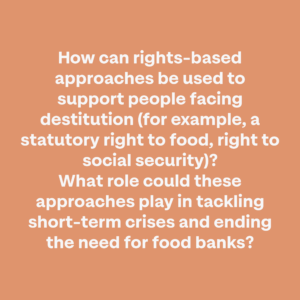
Feeding Liverpool recently submitted three submissions to the All-Party Parliamentary Group inquiry into ending the need for foodbanks. A wide range of opinions have been offered about the best way forward for ending the need for foodbanks – this work will form the foundations for a wider review of our city’s crisis response.
This series of blogs is taken from the Good Food Community Advocacy and Policy Group submission.
How can rights-based approaches be used to support people facing destitution (for example, a statutory right to food, right to social security)? What role could these approaches play in tackling short-term crises and ending the need for food banks?
Response written by Lucy Antal, Lead for Food Justice, Feedback[1], member of the Good Food Community and Advocacy Policy Group and BBC Food & Farming Awards Community Food Champion 2021.
First Covid-19, and now the cost of living crisis, have highlighted the simple inequity within society at present. Low paid jobs, with zero hours contracts, the complicated universal credit welfare system, and now the bumpy shift to digital for healthy start vouchers has left many households struggling to put food on the table. In a world where energy and transport costs are rising rapidly, and the cost of housing and council tax is also rising by % increments each year, food is often the only “moveable” bit of the household budget. Destitution is often only a missed pay check away (due to illness for example, as statutory sick pay is only £99 a week). The complex bureaucracy behind social security payments means waits of up to 5 weeks for support, so food aid organisations end up providing support.
A rights-based approach, on a cash first basis, creates a breathing space within this maelstrom of outside stressors. Citizens would truly have a safety net if this was enshrined in law. Food is a building block of life and we cannot survive long without it. Enabling or triggering immediate payments gives people agency and choice over their food purchasing and would support community initiatives such as food pantries, where a small fee membership gives access to a wider range of low-priced items. Food banks only work in a short-term capacity, and were indeed created as an emergency response for absolute destitution. They have now become ubiquitous, but the model is not sustainable – see the linked paper which challenges the “win win” scenario of food surplus redistribution becoming the solver of food insecurity[2]. At the same time as the rise of the food bank culture, we have seen a reduction in social spaces and citizen support mechanisms that once provided additional support in times of need. Children’s centres, youth services, older people’s social clubs and work canteens have all been whittled away in the past decade of austerity and public money reductions. Food banks are also not agile when it comes to supporting people with dietary or culturally based requirements, they have a rather workhouse approach of you get what you are given.
When you or your children are hungry, there is no room in your head for anything else. Young people in Blackburn with Darwen ran a campaign called #gettinghangry – which referenced the anger caused by hunger, which led to them being excluded from school on behavioural grounds when in fact they needed a meal. A cash first approach, as championed by IFAN (https://www.foodaidnetwork.org.uk/cash-first ) and the rights based approach from Ian Byrne MP (https://www.ianbyrne.org/righttofood-campaign) both seek to enable a basic human right of food being available to everyone, regardless of income or location. With over 11M people living in food insecurity, and 7.4M admitting to skipping a meal on a regular basis due to their financial situation, it is past time to consider this option, it needs to be ratified.
